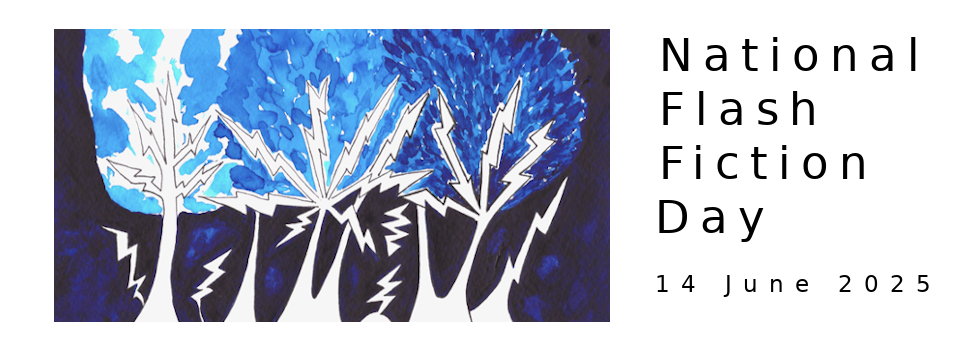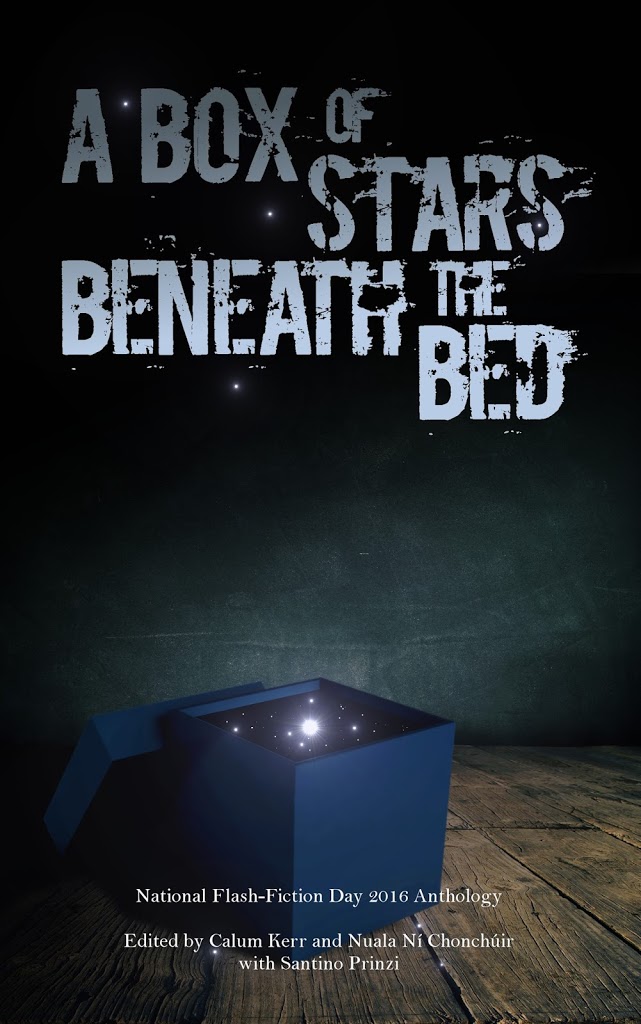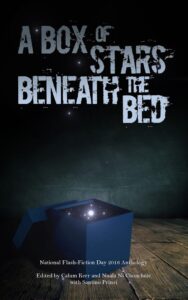A Box of Stars Beneath the Bed: National Flash Fiction Day 2016 Anthology is out now!
To purchase the paperback edition of the anthology, please follow this link here: A Box of Stars Beneath the Bed. The Kindle version of the anthology will be available soon.
We hope you enjoy reading the anthology. It really is mighty...a book full of star quality flashes!
'An anthology of flash-fictions to celebrate National Flash-Fiction Day (UK), showcasing the very best on offer in this small literary form. The tales cross genres from horror to romance, from fantasy to dark reality, but each one will cause a new star to shine in your imagination. Authors include: Sarah Hilary, Angela Readman, Claire Fuller, Paul McVeigh, Santino Prinzi, Nik Perring, Meg Pokrass, Michelle Elvy, Tim Stevenson, Debbie Young, Kevlin Henney, Nuala Ní Chonchúir and NFFD Director, Calum Kerr.'
Category: News
The Box of Stars Beneath the Bed – Cover Reveal
Well, I've spent all day with my crayons. I've done my best to stay inside the lines (I had my tongue peeking out of the corner of my mouth, and everything) and now have a finished cover for your viewing delectation.
So, here it is, hope you like it. On sale for National Flash-Fiction Day on 25th June 2016.
More information about all events at http://host2021.temp.domains/~nationo0/.
Anthology Title and Full Track Listing
Well, the anthology is now fully assembled, and we hope it will be available for sale online before the day. We can now reveal that the title will be A Box of Stars Beneath the Bed, taken from Jon Stubbington's story.
We've also managed to include a series of commissioned stories from a range of wonderful writers - some familiar names, and some up-and-coming writers. The full 'track-listing' is below, with all the wonderful stories you'll be able to read.
As well as online, we'll have copies of the book at the launch event in Bristol on NFFD itself. More information about that, all the other events, can be found on the website at http://host2021.temp.domains/~nationo0/events.html.
A Box of Stars Beneath the Bed
Anthology 2016
Well, we've finally made it through to the other side, and now we are able to announce the stories which have made it into this year's National Flash-Fiction Day anthology.
We received nearly 500 stories (168,000 words, or thereabouts) and these are the 50 which made it in. So, if you were unsuccessful, please take comfort that it was a difficult decision from a large field of excellent work. The ones that we picked are the stories we felt would make the most compelling compendium, and a great snapshot of current flash-fiction.
To those of you who made it in: Congratulations!
As well as the stories listed below, the anthology will include the 10 micro-fiction competition winners, plus a range of commissioned stories from some truly exceptional writers.
The anthology doesn't have a name yet, but we hope to announce it very soon, and it will be on sale on National Flash-Fiction Day at the event in Bristol (and possibly elsewhere) as well as online in paper and e-book formats.
Anyway, with no further waffle, here are the stories which will soon be printed up and bound for your edification.
In Dublin on Sunday 26th June 2016? Come to FlashDash!
As a part of this year's National Flash-Fiction Day celebrations, Big Smoke Writing Factory are presenting FLASHDASH on Sunday 26th June 2016!
You can get involved by reading your stories at this event, enter their 105-word competition, or just come along and enjoy listening to some brilliant flash!
For more details about the event, how to submit writing for the competition, and if you'd like to be considered to read at the event, please check out the Facebook event page here.
Come to Bristol for National Flash Fiction Day 2016!
NFFD 2016 Competition Results
Well, it only seems a little while ago we were announcing the longlist for our 100-word micro-fiction competition for 2016. And it was. But now, without having kept you waiting for too long, we're pleased to present the winners.
As I said in the last post, we had over 500 entries for this year's competition, and a word of thanks must go to the judges - Cathy Bryant, Kevlin Henney, Cathy Lennon, Angela Readman, Tim Stevenson and Rob Walton - for their hard work in reading through and making the difficult decisions.
Thanks to everyone who entered, and remember, if you weren't successful this time, there will be plenty more chances for you to be involved with National Flash-Fiction Day. Just go to the website at http://host2021.temp.domains/~nationo0/ to find out more.
Below are a list of the top ten stories, and below that we have shared the stories so you can see for yourselves what great winners we have. Please join us in congratulating these fine writers!
NFFD 2016 Competition Longlist
Hello Flash-fans,
Well, we're just one month away from the Day itself, and what better time to announce the longlist of stories selected by our judges from this year's Micro-Fiction competition.
These are the stories which were voted most highly by a consensus of the judges, making them the best stories out of the over 500 entries we received. Congratulations to those listed below, and to those who didn't make it: thank you for taking part and supporting National Flash-Fiction Day. Competition was fierce and we hope you will try again, and possibly take part in the other NFFD activities.
And so, with no further ado, in alphabetical order, here is the longlist:
Happy National Flash-Fiction Day 2015!
It's all happening, on this Day of Flash.
First, as soon as you've read this why not head over to our Facebook page or our Twitter feed to check out the stories coming thick and fast from the FlashFlood journal? There is one every 10 minutes for the whole day, a total of 144 fabulous stories.
And if you're rather write than read, then The Write-In is open once again, for one day only. So get scribbling!
 If that's not enough, our new anthology, Landmarks, is now available in paperback from Amazon for a special NFFD price of just £5.99 (usually £7.99). It's also available on Kindle for just 99p.
If that's not enough, our new anthology, Landmarks, is now available in paperback from Amazon for a special NFFD price of just £5.99 (usually £7.99). It's also available on Kindle for just 99p.
In addition, you can get the following Kindle books FREE or DISCOUNTED for today!
(Please check the price before purchasing, Amazon's offers system doesn't always play well, and we wouldn't want you to pay when you don't have to!)
NFFD Anthologies:
2014 - Eating My Words
2013 - Scraps
2012 - Jawbreakers
Quick Change by Debbie Young.
Mr & Mrs Flash by Calum & Kath Kerr
28 Far Cries by Marc Nash
Rapture and what comes after by Virginia Moffatt
The Book of Small Changes by Tim Stevenson
31 by Calum Kerr
Apocalypse by Calum Kerr
If that wasn't enough, there are actual real events happening all over the place! There are too many to mention here, so go to our Events Calendar to see what's happening, and maybe pop along to something near you, or take part in one of the online events.
I will be attending the FREE workshop, FREE Foyles reading and (sadly not free) drinks events in Bristol again this year. If you can, why not come along and say 'Hi'. I will be weighed down by copies of Landmarks, so you can always pick up yours there.
I'd like to take this chance to say a quick thank you to the judges from our Competition: Cathy Bryant, Cathy Lennon, Angela Readman, Kevlin Henney, Tim Stevenson and Jon Pinnock; Angi Holden for co-editing the anthology; Amy Mackelden, Tino Prinzi and Tim Stevenson for all their behind-the-scenes work; my co-editors of FlashFlood: Susi, Shirley, Annette, Cassandra, Susan and Caroline. And to everyone else who has pitched in, organised an event, written a story, retweeted a bit of news, or whatever. And special thanks to Kath, my wife, for putting up with all the tantrums it takes me to get this day organised.
You are all stars, fairies, unicorns, or otherwise mythical beasts of your choice.
Thank you!
Whatever you're doing today, I hope you have a wonderful time. National Flash-Fiction is such a celebration of the short short story, and it's all for you.
Thank you.
Calum Kerr
Director
National Flash-Fiction Day
Did you hear that?
Like sleigh bells in the distance on Christmas Eve, something special is approaching...



